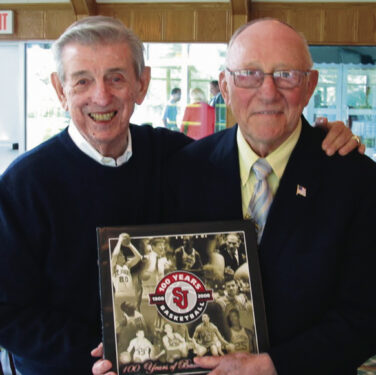
The St. John’s University, Jamaica, sports community received some sad news on May 25.
Jack Kaiser, a foundational figure in both the school’s history and in American intercollegiate athletics, passed away at the age of 95. A Mass of Christian burial was held June 1 inside St. Thomas More Church on the Queens campus.
To list out his numerous St. John’s career accomplishments would not do his legacy justice. Considered the patriarch of the Red Storm athletic department, Kaiser was plain and simply a saint himself when it came to his years of dedicated service – parts of nine different decades no less – to his beloved alma mater.
One of his close friends, former St. John’s men’s basketball coach Lou Carnesecca, said Kaiser was loved by all and served as a great role model to the young people on campus.
“I go back to 1947 with him,” the 96-year-old Carnesecca said. “All the accolades that you hear about are true. He was a special, special man and was really one of the truly great men that I know.
“If it wasn’t for Jack, I never would have coached at St. John’s. I owe a lot to this man. I still can’t believe he’s gone.”
John Warren Kaiser was born in Brooklyn on Oct. 6, 1926. He attended St. John’s Prep at its Bedford-Stuyvesant location before enlisting in the U.S. Army toward the end of World War II.
When he returned home in 1946, Kaiser enrolled at St. John’s, where he was a three-sport star for the Redmen. Most notably, Kaiser enjoyed his greatest success on the diamond as an outfielder, leading St. John’s to its first College World Series appearance in 1949 – his senior season.
Kaiser then signed a professional contract with the Boston Red Sox. As talented as he was, he realized that he’d have to crack an impressive outfield of Ted Williams, Dom DiMaggio, and Jackie Jensen to make it to the big leagues. That’s when he decided that coaching baseball would be much more of a reality for his career in sports.
He accepted an offer to join the baseball coaching staff at St. John’s, kicking off a career that would touch the lives of countless individuals over the next seven decades. He officially took over as head coach in 1956.
For the next 18 seasons, Kaiser turned the Johnnie into a perennial contender – amassing a record of 367-133-2, a .733winning percentage. His teams appeared in 11 NCAA Tournaments, including 1960 when Kaiser became the first person in NCAA history to lead his team to the College World Series as a player and a coach. He was back at the College World Series again in both 1966 and 1968.
Before the start of the 1973-1974 school year, Kaiser stepped down as the baseball coach to take the role of athletic director for the entire sports program. He impact in this role is still being felt nationally, as he was one of the founding fathers of the Big East Conference in 1979. He also oversaw the creation of women’s varsity sports programs at St. John’s starting in 1974.
“Words cannot adequately express what Jack meant to so many people,” said St. John’s Senior Deputy Athletic Director Kathy Meehan. “He was an inspiration and mentor to me. I am very blessed to have known him. Jack was a gentleman in every sense of the word, a true Vincentian who will deeply be missed.”
Kaiser retired in 1995 and became the department’s athletic director emeritus – a role in which he cherished as he shared a lifetime’s worth of wisdom with coaches, administrators, student-athletes, and fans. He served in this role right up until his death.
In addition to having the St. John’s baseball stadium named in his honor, the outstanding performer of the Big East baseball championship also bears Kaiser’s name. He’s a member of numerous Halls of Fame, including the American Baseball Coaches Association Hall of Fame, Eastern College Athletic Conference Hall of Fame, and Atlantic Collegiate Baseball League Hall of Fame.
No one connected with the St. John’s University sports scene will soon forget the profound impact Kaiser had both on and off the athletic fields. We remember his legacy as we salute this true icon and Catholic gentleman.
Contact Jim Mancari via email at jmmanc@gmail.com.
